hankyoreh
Links to other country sites 다른 나라 사이트 링크
No flowers and a seat at the back - Park Geun-hye knows how to hold a grudge
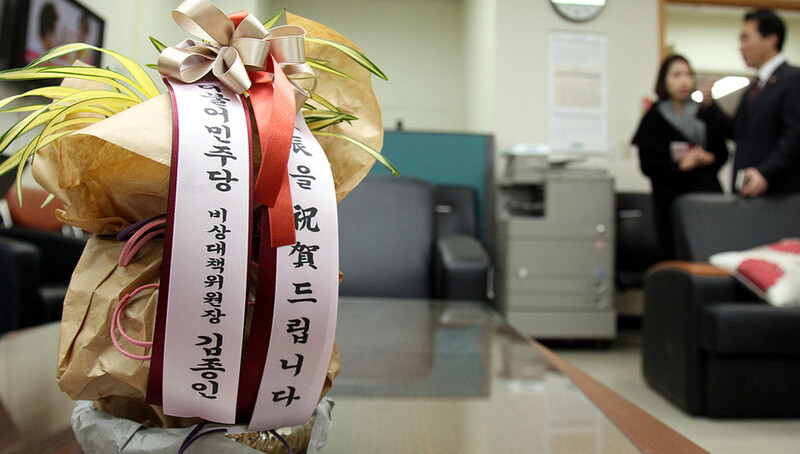
On Feb. 2, Kim Jong-in, head of the emergency countermeasures committee for the opposition The Minjoo Party of Korea (TMPK), tried to send a gift of potted orchids as a gesture of congratulations for President Park Geun-hye’s 64th birthday. It was turned down. As the controversy snowballed, the Blue House responded that afternoon by accepting the flowers after all, saying the senior political affairs secretary had “respectfully declined after the determination was made that it was inappropriate to give or receive orchids at a time when even agreed-upon legislation is not being passed.”
“President Park later received a report and delivered a stern reprimand,” it added.
Whether the initial rejection was simply the secretary’s mistake or Park expressing her pique with Kim, a former aide who later became chief of the lead opposition party, is beyond anyone’s ability to know. The reason so many observers are leaning toward the latter explanation is that it joins a long list of similar grudge gestures from Park.
1. Sending no flowers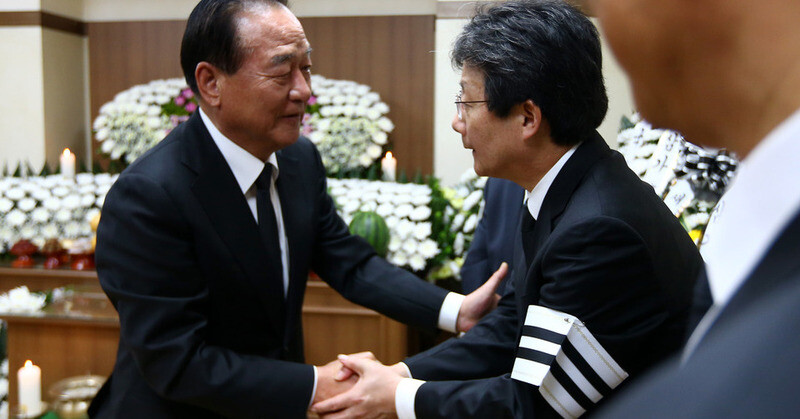
Yoo Seung-min, former floor leader for the ruling Saenuri Party (NFP), began a three-day formal mourning period for his father on Nov. 8. During that time, Park never sent any condolence flowers.
The Blue House’s explanation at the time was that there was “no practice of sending flowers when the individual in question declines.” But is that actually the case? In May, then-Prime Minister nominee Hwang Kyo-ahn said he was not accepting standing flower arrangements for his daughter’s wedding, but Park sent an arrangement anyway.
Yoo also was not visited by any Blue House staffers during his mourning period. At one point, he reached out to Chief of Staff Lee Byung-kee, a close friend who had worked with him as a key adviser in Park’s camp during the 2007 presidential primary. Lee never came. Blue House senior economic secretary Ahn Jong-beom, another friend who had earned a doctoral degree from the University of Wisconsin around the same time as Yoo, sent his wife instead.
“I’m sure even they would have liked to go to him, but they had to be conscious of the President’s wishes,” said one source close to Yoo.
The Blue House similarly declined to send flowers from Park after Lee Sang-don, a former Chung-Ang University professor who played a key role in Park’s election camp, lost his mother in Nov. 2014. After the election, Lee had been a vocal critic of Park, whom he accused of failing to honor her campaign pledges.
2. No place at the table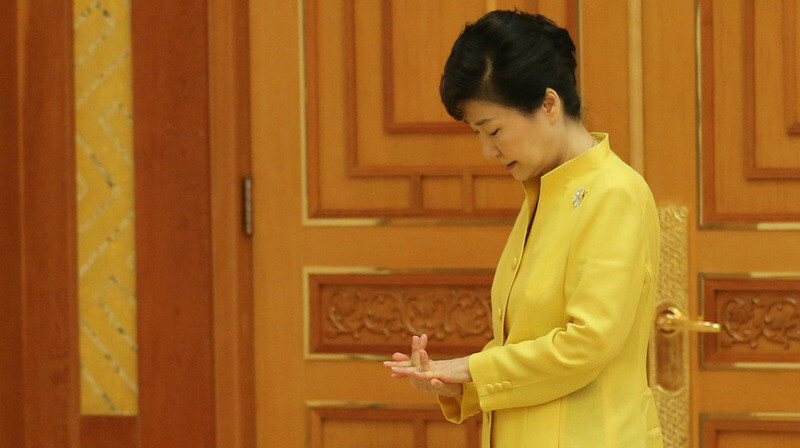
On July 2 of last year, Park met with National Assembly speakers from the countries in MIKTA, an association of five “middle powers” (Mexico, Indonesia, South Korea, Turkey, and Australia), at the Blue House. Conspicuously off the guest list was the speaker of South Korea’s own National Assembly and MIKTA’s organizer, Chung Ui-hwa. Initially, Park had planned to invite the speakers to the Blue House for a luncheon meeting with Chung present, but the event ended up “condensed” into just a meeting, which Chung was not asked to attend.
“All we can say is ‘no comment,’” a source with the speaker’s office said on the Blue House’s decision not to invite Chung.
But the same source also let on that Chung was unhappy over the slight.
“I’m sure you can figure it out,” the source said.
Around a month earlier, Park had been in a battle with the National Assembly. An amendment to the National Assembly Act was passed demanding that the administration revise enforcement decrees that violated the law; Park responded by exercising her veto rights. According to sources, Chung earned Park’s rancor in the process for submitting an arbitration plan for the law.
3. Avoiding eye contact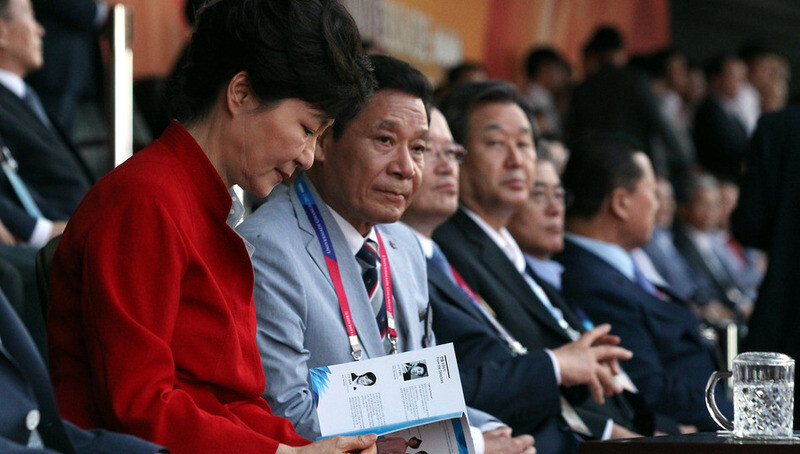
At the opening ceremony for the Gwangju Universiade on July 3, 2015, Park avoided even looking the way of NFP chairperson Kim Moo-sung. He was also the only one of the people sharing the VIP section with her that she did not shake hands with until they left. “She won’t even look at us,” sources reported Kim as saying.
Chung Ui-hwa, National Assembly speaker, received similar treatment. Sources reported that he approached Park and asked to “meet sometime in the near future,” but received no real reply from her.
Kim had also previously sided with then-NFP floor leader Yoo Seung-min in dismissing the Blue House’s objections to the National Assembly Act amendment, which would have increased the parliament’s powers to demand revisions to administrative legislation.
4. Seating at the back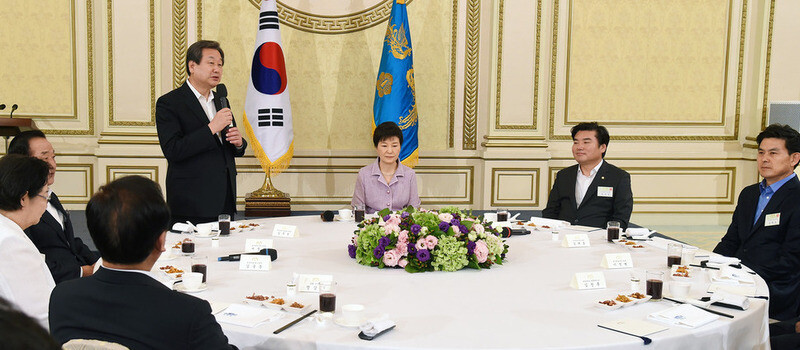
On Aug. 26 of last year, Park invited all NFP lawmakers in the National Assembly for a luncheon at the Blue House. The event itself was a pleasant enough affair. What drew notice was the seating chart.
NFP supreme council members and other party leaders were seated at the round head table with Park and Kim; next to them were lawmakers with official party positions and members of the National Assembly Standing Committee. Other lawmakers were assigned to tables by committee.
Of those committee tables, the one given to the National Defense Committee was situated farthest back in the room. Yoo Seung-min is a member of the National Defense Committee. As one of the chief figures behind the National Assembly Act amendment controversy, Yoo was forced to give up his position as floor leader and ended up branded a “traitor” by Park.
5. A long memory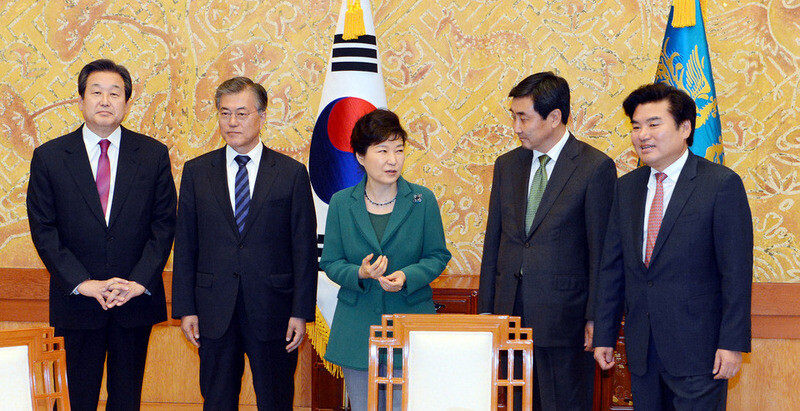
On Oct. 22 of last year, Park met at the Blue House with Moon Jae-in, then-leader of the opposition New Politics Alliance for Democracy (NPAD; now the TMPK); NPAD floor leader Lee Jong-kul; NFP chairperson Kim Moo-sung; and NFP floor leader Won Yoo-chul.
During the meeting, Park addressed Lee.
“Looking at you just now, I thought you made a good impression and spoke well, but you’re the same one who referred to me as geunyeon and inyeon before,” she was quoted as saying. “If you speak well like you did today, you’ll become more popular and things will go better for you.”
“You’re such a presentable person . . . why were you using words like inyeon and geunyeon back then? I was shocked,” she reportedly added.
In Korean, geunyeon and inyeon are considered highly offensive terms to refer to a woman.
The words themselves were not delivered sternly, and a stammering Lee was reported to have replied that he “shouldn’t have done it” and apologized.
Park’s reference late in the meeting to Lee’s use of the term geunyeon stems from a tweet he posted in Aug. 2012. Responding to a controversy within the NFP over “financial offerings” for nominations, he wrote, “Their owner is Rep. Park Geun-hye. She [geunyeon] is all high and mighty, shuffling and not apologizing.”
The message ended up causing controversy over his use of an offensive term. At first, he said he had meant geunyeon as a contraction of geunyeo-neun, a regular, inoffensive word meaning “she.” He later claimed that he had mistyped on his small iPhone keypad.
“I am very sorry if anyone was offended by my unintended insult,” he said by way of apology.
Park never forgot. Three years and two months later, in a face-to-face setting, she made sure to get an in-person apology of her own.
By Kim Won-chul, staff reporter
Please direct questions or comments to [english@hani.co.kr]
Editorial・opinion
![[Column] Park Geun-hye déjà vu in Yoon Suk-yeol [Column] Park Geun-hye déjà vu in Yoon Suk-yeol](https://flexible.img.hani.co.kr/flexible/normal/500/300/imgdb/original/2024/0424/651713945113788.jpg) [Column] Park Geun-hye déjà vu in Yoon Suk-yeol
[Column] Park Geun-hye déjà vu in Yoon Suk-yeol![[Editorial] New weight of N. Korea’s nuclear threats makes dialogue all the more urgent [Editorial] New weight of N. Korea’s nuclear threats makes dialogue all the more urgent](https://flexible.img.hani.co.kr/flexible/normal/500/300/imgdb/original/2024/0424/7317139454662664.jpg) [Editorial] New weight of N. Korea’s nuclear threats makes dialogue all the more urgent
[Editorial] New weight of N. Korea’s nuclear threats makes dialogue all the more urgent- [Guest essay] The real reason Korea’s new right wants to dub Rhee a founding father
- [Column] ‘Choson’: Is it time we start referring to N. Korea in its own terms?
- [Editorial] Japan’s rewriting of history with Korea has gone too far
- [Column] The president’s questionable capacity for dialogue
- [Column] Are chaebol firms just pizza pies for families to divvy up as they please?
- [Column] Has Korea, too, crossed the Rubicon on China?
- [Correspondent’s column] In Japan’s alliance with US, echoes of its past alliances with UK
- [Editorial] Does Yoon think the Korean public is wrong?
Most viewed articles
- 1‘We must say no’: Seoul defense chief on Korean, USFK involvement in hypothetical Taiwan crisis
- 2N. Korean delegation’s trip to Iran shows how Pyongyang is leveraging ties with Moscow
- 3Amnesty notes ‘erosion’ of freedom of expression in Korea in annual human rights report
- 4‘Weddingflation’ breaks the bank for Korean couples-to-be
- 5[Reportage] On US campuses, student risk arrest as they call for divestment from Israel
- 6[Column] Park Geun-hye déjà vu in Yoon Suk-yeol
- 7Korea sees more deaths than births for 52nd consecutive month in February
- 8[Editorial] New weight of N. Korea’s nuclear threats makes dialogue all the more urgent
- 9Will NewJeans end up collateral damage in internal feud at K-pop juggernaut Hybe?
- 10[Guest essay] The real reason Korea’s new right wants to dub Rhee a founding father